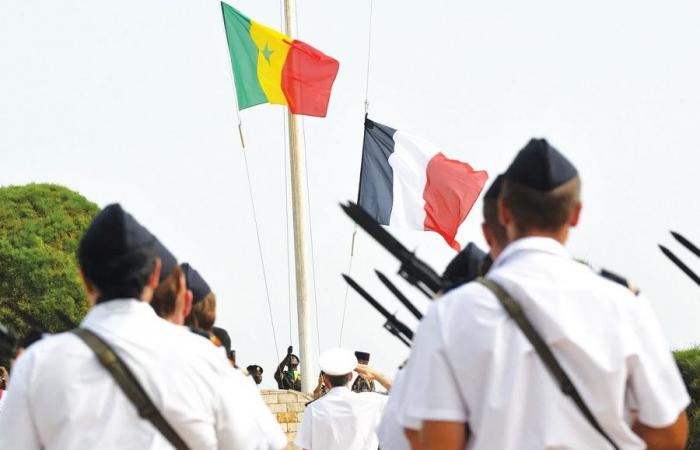The speech by President Bassirou Diomaye Faye, delivered on December 31, 2024, marks a pivotal moment in the contemporary history of Senegal. The address, imbued with solemnity, was intended to be a bridge between popular aspirations and concrete actions, drawing a clear vision for a united, sovereign and prosperous Senegal. The Head of State announced the end of the French military presence from 2025, emphasizing a desire to strengthen national sovereignty. This decision is part of a strategic overhaul of defense, while affirming an active, open and committed diplomacy for just causes on a global scale.
THE PRESENCE AND FRENCH MILITARY TOOLS IN SENEGAL
Upon its accession to independence in 1960, Senegal maintained a special relationship with France, notably through the French military presence on its soil. This collaboration was part of the defense agreements signed at independence, which aimed to meet strategic and political objectives. They were supposed to ensure political stability and security in a fragile West African region. France, keen to maintain influence in its former colonies, considered Senegal as a strategic point for its operations in Africa. Dakar, in particular, with its deep-water port and geographic position, was ideal for establishing a military base capable of projecting forces into the region. This presence was initially perceived as a guarantee of security against possible external threats and logistical support in its own military capabilities. However, over the years, the foundations and evolution of this presence have been differently perceived by the different successive Senegalese presidents before Bassirou Diomaye Faye, according to their priorities and their sensitivities.
THE POSITIONS OF SENEGALESE PRESIDENTS
Léopold Sédar Senghor (1960-1980), first president of Senegal, saw the French military presence as a lever for modernization and a guarantee of stability. Convinced of the importance of close collaboration with France, he considered that the political autonomy of Senegal should not be accompanied by a brutal break with the former colonizer. Thus, the French military base in Dakar has been maintained as a symbol of this privileged relationship. With Abdou Diouf (1981-2000), perception evolves.
In a context of advanced decolonization and the rise of nationalist demands in Africa, Diouf adopts a more pragmatic approach. It retains defense agreements, but works to strengthen national military capabilities to reduce dependence on France. Its policy has aimed to balance cooperation with other international partners, while maintaining a cordial relationship with Paris. It is Abdoulaye Wade (2000-2012) who truly marks a symbolic break. Critical of French influence in Africa, Wade called for the closure of the French military base in Dakar in 2010. This decision was part of his desire to strengthen national sovereignty and reposition Senegal on the international scene.
However, this closure did not amount to the end of military cooperation: joint missions and training continued to be carried out. Under Macky Sall (2012-2024), the military relationship with France has been more cooperative than conflictual. In a context marked by the rise of terrorist threats in the Sahel, Macky Sall relied on France to strengthen regional security, while continuing the development of the Senegalese armed forces. Cooperation has diversified, extending to international operations and logistical support. Under his presidency, military presence and security cooperation with France have been crucial to protecting Senegal against growing threats from the Sahel region, marked by growing instability due to the rise of groups such as Al- Qaeda in the Islamic Maghreb (AQIM), Islamic State in the Greater Sahara (ISGS) and Boko Haram. Despite the closure in 2010 by Abdoulaye Wade of the French military base, Senegal remained a key element for operations in the Sahel, notably during the Barkhane initiative. French forces used Dakar as a strategic transit point for their regional missions. One of the cornerstones of this cooperation has been the sharing of strategic information. Senegal, a relatively stable country in an increasingly fragile region, has become a key player in collecting and processing intelligence on terrorist activities in the Sahel. This collaboration made it possible to anticipate and prevent possible infiltrations of armed groups in Senegal.
A CHANGING FRENCH STRATEGY
If the heads of state had different visions and positions regarding the French military presence on Senegalese soil, the gradual reduction of French forces in Senegal and more widely in Africa began to be considered in France, as early as the 1990s. With the fall of the Berlin Wall in November 1989, bringing with it that of the Eastern Bloc, Africa, in his eyes, had lost part of its importance in the field of rivalry East-West. Added to this were increasingly strong internal pressures to reduce military spending and growing demands for autonomy from African countries.
In 2010, under the presidency of Nicolas Sarkozy, France reorganized its military bases. If in Senegal this decision was motivated by the political will of Abdoulaye Wade, elsewhere, it was part of a broader strategy aimed at concentrating French military resources on other bases such as those of Djibouti, Libreville in Gabon and Ndjamena in Chad. In West Africa, although having reduced its permanent bases, operations like Serval in 2013 showed that Paris remained committed to the region. But observers have highlighted a change in doctrine: France has favored these targeted and temporary interventions in partnership with local armies. From 2021, faced with a rise in anti-French sentiments (read article “Frapp France Dégage”) and the aspirations of the populations for more sovereignty, marking a change of tone compared to the traditional policy of “Françafrique”, France has announced a significant reduction in its military presence in the Sahel, so as to no longer be perceived as it was for a long time, as the “policeman” of Africa. In 2022, Emmanuel Macron will roll out a new strategy for the French presence in Africa, focused on cooperation rather than on maintaining permanent troops.
END OF THE FRENCH MONOPOLY, EMERGENCE OF AN AFRICAN MULTILATERALISM
Created in 2014, the G5 Sahel is an organization bringing together five Sahelian countries: Mali, Niger, Burkina Faso, Mauritania and Chad. Its main objective was to coordinate efforts to respond to security and development challenges in this region hard hit by terrorism, cross-border insecurity and humanitarian crises. However, Senegal, although geographically close to the Sahel, is not a member. This absence is based on several considerations.
A GEOGRAPHICAL AND SECURITY QUESTION
The G5 Sahel brings together countries directly located in the Sahel strip and facing high terrorist threats. These nations share porous borders where armed groups like Al-Qaeda in the Islamic Maghreb (AQIM) and the Islamic State in the Great Sahara (ISGS) operate. In comparison, Senegal, located on the Atlantic coast, is geographically far from the epicenters of these conflicts. Although vigilant in the face of the rise in terrorism, the country has not faced significant attacks on its soil, unlike its Sahelian neighbors. Therefore, its inclusion in the G5 Sahel was not an immediate priority.
A DIFFERENT STRATEGIC CHOICE
Rather than joining the G5 Sahel, Senegal has focused its efforts on other regional cooperation frameworks, notably the Economic Community of West African States (ECOWAS), and Minusma (Multidimensional Integrated Mission of the Nations United for Stabilization in Mali). An active member of ECOWAS, Senegal participates in peacekeeping and stabilization initiatives in the West African region. This strategy allows it to avoid too close an association with the Sahelian crises while playing a significant role regionally. On March 18, 2022, during a sober but solemn ceremony, Major General Usman Abdoumumuni Yusuf passed the torch to Senegalese Brigadier General Moctar Diop. Before December 8, 2023, the date of the conclusion of the departure of Minusma from Mali, it was a Senegalese Major General, Mamadou Gaye, who replaced the Dutchman Johannes Kees Matthijssen.
A DESIRE TO PRESERVE ITS STABILITY
Senegal cultivates an image of political stability and a democratic model in West Africa. Participating directly in the G5 Sahel, an organization strongly associated with acute crisis zones, could have blurred this image. In addition, the Macky Sall regime, when the G5 was created in 2014, preferred to concentrate its efforts on preventive approaches to combat radicalization. If the definitive closure announced by the French base in Senegal by the President of the Republic in his speech on December 31 closes a cycle of nearly six decades of French military presence on Senegalese soil, a layman can say that this does not change anything that does not fall under the symbol. The war now practically no longer needs a presence on the ground. Drones can drop projectiles over territory while being controlled thousands of kilometers away. The Iranian attack on Israel, the Ukrainian strikes in the Kursk region showed the world, drones crossing countries in order to hit their target. Warfare is technological, as is intelligence. What the President does not say, however, is what defense policy Senegal is implementing following this decision to send out French troops. It will be objected that this falls under “defense secrecy”. Questions remain. Who will produce weapons and military equipment for Senegalese soldiers? Where will the Senegalese officers be trained if not for many and until now in Saint-Cyr or Melun? Our most brilliant officers are proud to have cut their teeth at the War School in France or at Westpoint and Paris still supports us, in terms of intelligence and border surveillance in the war against terrorism in the Sahel strip. . Are we going to undress Paul to dress Sergei, as we see in certain “sovereignist countries”, with the strong military presence of Russia, through the Wagner private militia? This would be the height of the height, since a sovereignty claimed and assumed cannot be under supervision.
HENRIETTE NIANG KANDÉ






